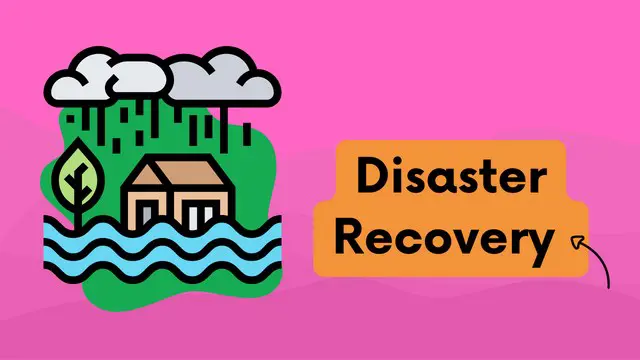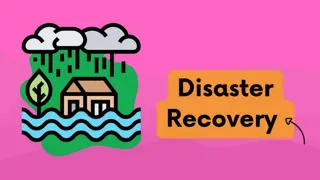
Disaster Recovery Training
CPD Certified| Free PDF Certificate | Lifetime Access | Learner Support | No Hidden Fees | 100% Success Rate
EDURISE
Summary
- Certificate of completion - Free
- Reed courses certificate of completion - Free
- Tutor is available to students
Add to basket or enquire
Overview
Are you prepared for the unexpected? In an increasingly digital world, organizations face numerous threats that could disrupt their operations, from cyberattacks to natural disasters. Disaster recovery has become a critical aspect of business continuity, and those with expertise in this field are in high demand.
Introducing our Disaster Recovery Training
In today's fast-paced and interconnected world, it's not a matter of "if" but "when" a disaster or disruption will occur. This is where disaster recovery professionals come into play.
Key Highlights of our Disaster Recovery Training:
Master Disaster Recovery Planning: Learn how to create comprehensive disaster recovery plans tailored to various types of disasters, ensuring your organization is prepared for any eventuality.
Cybersecurity Resilience: Understand the growing threat of cyberattacks and how to protect your organization's critical data and systems.
Data Backup and Recovery: Explore best practices for data backup, ensuring that your organization can recover swiftly and efficiently.
Testing and Simulation: Practice makes perfect. We teach you how to conduct disaster recovery simulations, so you're ready when a real disaster strikes.
Vendor and Stakeholder Communication: Effective communication with stakeholders and third-party vendors is crucial during a disaster. Learn how to manage these relationships successfully.
Who Should Enroll in this Course?
IT Professionals: Individuals working in IT, especially those involved in system administration, cybersecurity, or data management, will benefit from this course to enhance their skills.
Business Continuity Planners: If you're tasked with maintaining business continuity in your organization, this training will equip you with the tools you need.
Managers and Executives: Business leaders can gain a better understanding of disaster recovery to make informed decisions for their organizations.
Risk Management Professionals: Those focused on risk assessment and management will find this course valuable for bolstering their knowledge and capabilities.
Data Protection Officers: With the increasing importance of data protection, this training is highly relevant for data protection officers and compliance professionals.
Entrepreneurs and Small Business Owners: Even small businesses need disaster recovery plans. This course will help you secure your investment.
Why Disaster Recovery Training Matters:
Protect Your Organization: Learn how to safeguard your organization's critical data and systems from potential disasters.
Career Advancement: Disaster recovery skills are in high demand. By completing this course, you'll enhance your career prospects.
Peace of Mind: Knowing you're prepared for the unexpected brings peace of mind, both professionally and personally.
In a world where disasters, whether natural or man-made, can strike at any moment, being prepared is non-negotiable. Enroll in our Disaster Recovery Training today and equip yourself with the skills and knowledge to protect your organization and advance your career. Don't wait until disaster strikes; act now and be ready for whatever comes your way.
Free Gift
- Course Completion PDF Certificate
- Tutor Support
Curriculum
Course media
Description
Certainly, here are the learning outcomes and descriptions for each module of the "Disaster Recovery Training" course curriculum:
Learning Outcomes:
Chapter 1 – Preparation
- Understanding Disaster Preparedness: Gain a deep understanding of disaster preparedness, including the importance of assessing risks and developing a comprehensive preparedness plan.
- Risk Assessment: Learn how to identify and assess potential risks and vulnerabilities within your organization, helping you take proactive steps to mitigate them.
- Developing Disaster Recovery Policies: Explore the development of disaster recovery policies that align with organizational goals and industry best practices.
Chapter 2 – Making a Disaster Supply Kit
- Essential Supplies: Understand the critical supplies and resources needed during a disaster, and how to assemble a well-rounded disaster supply kit.
- Emergency Food and Water: Learn the principles of food and water storage, ensuring a reliable source of sustenance during emergency situations.
- First Aid and Medical Supplies: Discover how to create a first aid kit and understand basic medical supplies necessary for addressing injuries during a disaster.
Chapter 3 – Emergency Actions
- Immediate Response: Master the immediate actions required in the event of a disaster, including safe evacuation and sheltering techniques.
- Communication Protocols: Develop effective communication protocols to ensure contact with family, coworkers, or emergency services during a crisis.
- Risk Mitigation Strategies: Explore strategies for managing risks effectively during a disaster, protecting lives and assets.
Chapter 4 – Types of Disasters and How to Deal with Them
- Natural Disasters: Gain knowledge of various types of natural disasters, such as earthquakes, hurricanes, and floods, and learn how to respond appropriately.
- Man-Made Disasters: Understand the unique challenges posed by man-made disasters like cyberattacks or industrial accidents and how to address them.
- Critical Decision-Making: Develop the skills to make critical decisions in high-pressure situations, ensuring the safety and well-being of individuals and organizations.
Chapter 5 – Managing During a Disaster
- Organizational Continuity: Learn how to implement strategies to ensure organizational continuity and minimize disruptions during and after a disaster.
- Crisis Management: Acquire the skills to effectively manage a crisis situation, including coordinating response efforts, mobilizing resources, and leading teams.
- Community Support and Recovery: Understand the importance of community support and recovery efforts, both at the organizational and community levels.
This course equips you with the knowledge and skills to navigate the complex landscape of disaster recovery and preparedness, empowering you to protect lives, property, and critical assets during emergencies. With a strong focus on disaster response and mitigation, you'll be well-prepared to face various types of disasters and emergencies effectively.
Certificate of Completion
After completing the Disaster Recovery diploma course, you will be able to obtain your free PDF certificate of course completion.
Who is this course for?
Ideal Audience for "Disaster Recovery Training":
Small and Medium-sized Business Owners: Small and medium-sized business owners looking to safeguard their enterprises from disasters and emergencies.
Office Managers: Office managers responsible for the safety and continuity of operations within their organizations.
Homeowners and Families: Individuals and families interested in ensuring their homes and loved ones are well-prepared for various types of disasters.
Community Leaders: Community leaders and volunteers aiming to create safer and more resilient neighborhoods.
Risk Management Professionals: Risk management professionals seeking to enhance their knowledge and strategies in disaster preparedness.
Non-Profit and NGO Staff: Staff of non-profit organizations and non-governmental organizations engaged in disaster relief and community support.
Educators and Trainers: Teachers and trainers focused on disaster preparedness and safety education.
First Responders: First responders and emergency services personnel seeking comprehensive training in disaster recovery.
Public Health Officials: Public health officials involved in managing health-related aspects of disasters.
Government Personnel: Government personnel responsible for disaster preparedness and response at local, state, or federal levels.
This course is suitable for a broad audience interested in acquiring foundational knowledge and skills for disaster recovery and preparedness. It equips learners with the essential tools and strategies to manage different types of disasters, from natural calamities to man-made emergencies, ensuring the safety and resilience of individuals, organizations, and communities.
Requirements
The Disaster Recovery course has no formal entry requirements.
Career path
- Disaster Recovery Coordinator: Entry-level position with a typical UK salary ranging from £25,000 to £35,000 per year.
- Disaster Recovery Specialist or Business Continuity Analyst: With experience and certifications, salary can advance to between £36,000 and £60,000.
- Senior Disaster Recovery Manager or Chief Resilience Officer: Experienced professionals in these roles may earn £61,000 to £100,000.
Questions and answers
Currently there are no Q&As for this course. Be the first to ask a question.
Certificates
Certificate of completion
Digital certificate - Included
Reed courses certificate of completion
Digital certificate - Included
Will be downloadable when all lectures have been completed
Reviews
Currently there are no reviews for this course. Be the first to leave a review.
Legal information
This course is advertised on reed.co.uk by the Course Provider, whose terms and conditions apply. Purchases are made directly from the Course Provider, and as such, content and materials are supplied by the Course Provider directly. Reed is acting as agent and not reseller in relation to this course. Reed's only responsibility is to facilitate your payment for the course. It is your responsibility to review and agree to the Course Provider's terms and conditions and satisfy yourself as to the suitability of the course you intend to purchase. Reed will not have any responsibility for the content of the course and/or associated materials.


